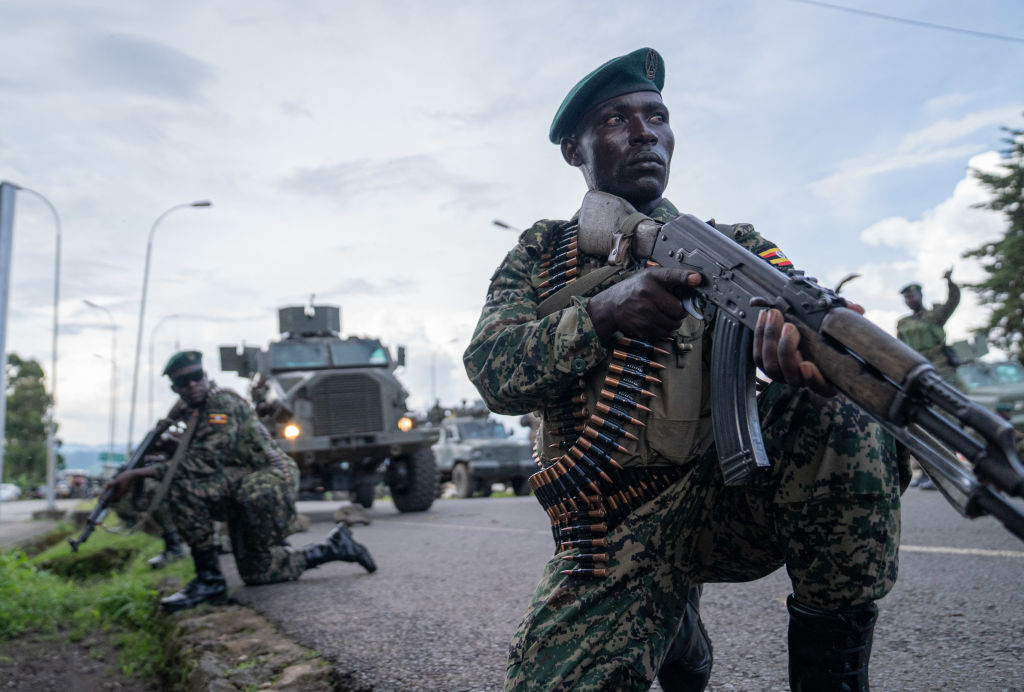ADF STAFF
Troops with the Uganda People’s Defense Force (UPDF) marched through thick forest in the mountains of eastern Democratic Republic of the Congo (DRC) with their weapons ready. In the DRC’s North Kivu province, fresh fighting with M23 or Allied Democratic Forces rebels can erupt at any time.
The UPDF deployed 1,000 Soldiers to the region in late March to join troops aligned with the East African Community Regional Force (EACRF) in efforts to stabilize the country where more than 120 armed groups operate. Uganda now has about 9,000 troops fighting in the DRC, Ugandan newspaper Daily Monitor reported.
Shortly after officials announced the deployment, Ugandan troops killed 32 Allied Democratic Forces fighters and recovered weapons and ammunition during multiple battles, according to UPDF Maj. Gen. Dick Olum.
“There has been a lot of achievement,” Olum told Ugandan public broadcast service UBC. “One commander with the [Allied Democratic Forces] was hit. A lot of weapons were recovered from him.”
Through most of March, there was little fighting between EACRF forces and rebel groups, but the M23 was accused of summarily executing civilians and battling frequently with local pro-government militias. The M23 staged a major offensive in 2022, seizing large chunks of North Kivu territory and forcing hundreds of thousands of people from their homes.
Shortly after their recent deployment, Ugandan Soldiers helped liberate the border town of Bunagana after more than nine months of M23 occupation. On April 9, Ugandan forces took over Kiwanja in eastern DRC’s Rutshuru Region after the M23 withdrew, the Daily Monitor reported.
Olum said it took some time for Ugandan troops to acclimate to the heavily thicketed terrain near Goma, capital of the North Kivu province.
“But now we are used to the situation on the ground,” Olum told UBC. “It is a vast area, but achievement is all about the pressure we have exerted on them.”
The March deployment brought the number of Uganda security personnel on foreign missions to about 12,000, including more than 3,000 in Somalia and hundreds in Equatorial Guinea and South Sudan.
On April 17, members of the UPDF’s Battle Group 35 serving in the African Union Transition Mission in Somalia (ATMIS) were lauded for their mettle in fighting al-Shabaab militants who control several parts of the country.
ATMIS Force Commander Maj. Gen. Peter Kimani Muteti said the Ugandan troops were instrumental in helping to liberate several strategic towns across the country.
“The courage and resilience they displayed represent the finest values of professionalism in soldiering,” Muteti told Somali news website Garowe Online. “The ATMIS leadership genuinely appreciates the work ethic and culture of the troops, a trait earned as a result of UPDF’s strong background in military training.”
Despite such praise, some critics have said that the deployment of nearly one-quarter of Uganda’s troops to other nations could be a national security risk. That suggestion rankled Ugandan Brig. Gen. Felix Kulayigye, spokesperson of the Ministry of Defense and Veterans Affairs.
“Does anybody expect us to leave the country empty [without soldiers]?” Kulayigye told the Daily Monitor. “It bothers me when non-military experts pretend to be experts on the subject they don’t know.”

